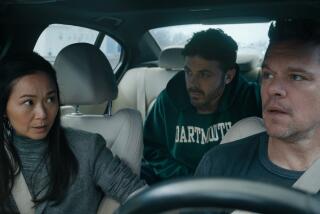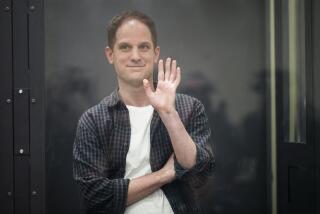Opinion: After the Oscars, Edward Snowden the sequel?
Was Edward Snowden watching TV in Moscow at about 4:30 on Thursday afternoon there, when the Oscars folks announced that “Citizenfour,” the film about him and journalist Glenn Greenwald, was a nominee for best feature documentary?
If the film wins an Oscar next month, Snowden, facing felony charges in the U.S., can’t be expected to be celebrating in L.A. with the filmmaker, Laura Poitras.
The film is a gripping, edge-of-the-seat, real-time tick-tock about Snowden – a whistle-blowing hero or an unpatriotic spiller of sensitive secrets, depending on your P.O.V., as they say in moviemaking – and the stories his revelations created.
We see him in a Hong Kong hotel room, sharing his trove of National Security Agency documents with Poitras, Greenwald and Ewan MacAskill, another journalist. We see Snowden besieged by reporters when he outed himself as the source of the classified material about the breadth of the NSA’s international intelligence and surveillance programs.
Lastly, we see Snowden in Moscow, where he has found a temporary haven, avoiding arrest, espionage charges and a likely trial.
As I watched “Citizenfour,” I imagined a sequel, perhaps a drama like the 1977 TV movie, “The Trial of Lee Harvey Oswald.” Wait, you’re probably thinking -- Lee Harvey Oswald was murdered two days after JFK. There was no trial. Right you are. The TV movie imagined what a trial might look like if Ruby hadn’t shot Oswald in the basement of the Dallas jail.
What could a similar film about a possible Snowden trial look like in skillful hands? How would the government’s case fare, casting him as a traitor? What forces would be arrayed for and against him in the courtroom? Would a Snowden movie defense be nipped in the bud by the courts, as happened to Pentagon Papers whistle-blower Daniel Ellsberg?
Ellsberg told the Guardian newspaper, “As I know from my own case, even Snowden’s own testimony on the stand would be gagged by government objections.”
The government’s case against Ellsberg, which included illegal wiretap evidence, was so bungled that the judge declared a mistrial and dismissed charges against Ellsberg and his co-defendant.)
Is there ever likely to be a real Snowden trial? Will Snowden choose to come back – to, as Secretary of State John Kerry put it, “face the music” for releasing NSA documents? Kerry argues that Snowden would have a fair and open trial here; Ellsberg counters that the government holds all the cards in a court setting, and that Snowden and others like him can safely make their cases only outside of this country.
And yet a real Snowden trial would be a kind of live-fire exercise forcing Americans to confront issues of civil liberties and national security, privacy and surveillance and whistle-blowers.
It might, as the Pentagon Papers case did, make a landmark Supreme Court ruling about press freedom, and reshape assumptions and practices about government.
Assuming, of course, that the courts would let Americans hear the details, some of which are already afoot on the Internet.
How would Snowden come out of that? And, as a country, how would we?
Follow Patt Morrison on Twitter @pattmlatimes
More to Read
A cure for the common opinion
Get thought-provoking perspectives with our weekly newsletter.
You may occasionally receive promotional content from the Los Angeles Times.










